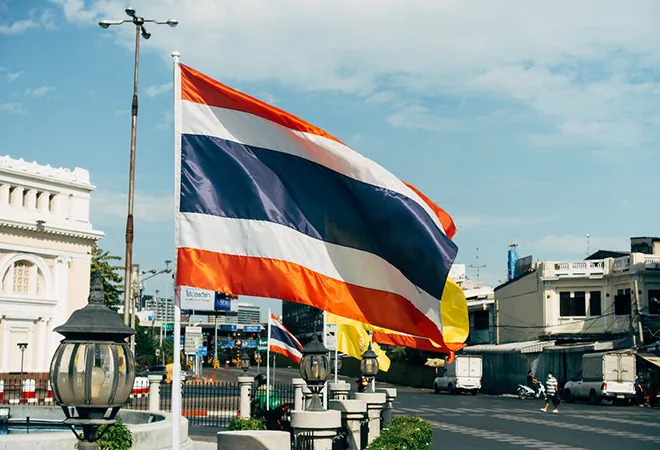-
CENTRES
Progammes & Centres
Location
Democracy in Asia a mixed bag, Thailand still a “flawed democracy”

On 20 March, the Thai parliament was dissolved, setting the tone for the election on 14 May – given the necessity of holding elections within 45 to 60 days (about two months) after the dissolution. Thailand is currently facing civil unrest due to calls for an end to the quasi-military leadership under incumbent Prime Minister Prayut Chan-o-cha. Among the most intriguing political candidates competing for the premiership is Paetongtarn Shinawatra, the daughter of former Prime Minister Thaksin Shinawatra and niece of Thailand’s first female Prime Minister Yingluck Chinnawat—both of whom were ousted from power by coups in 2006 and 2014, respectively. Given such configurations, the stakes remain significantly high in the context of the future of Thai national politics.
A resurging Pheu Thai party amidst national economic instability
The state of Thailand’s contemporary domestic politics continues to be riddled with complexities and challenges that restrict the voice and decision-making capabilities of the youth. In fact, prominent democracy-trackers such as The Economist’s Democracy Index 2022, ranked the Southeast Asian country among the lower half of its “flawed democracy” list. Thailand has endured at least 12 military coups since 1932, with the legislative system being significantly tailored to the interests of the Thai military and the royalists. Among several critical issues of governance impacting Thailand, the area of economics is seen to be the most critical. High cost of living, limitations in job opportunities, constrained wages, household debts, and a staggering national growth rate are some of the many socio-economic dilemmas directly and indirectly impacting the people of Thailand.
The state of Thailand’s contemporary domestic politics continues to be riddled with complexities and challenges that restrict the voice and decision-making capabilities of the youth.
Consequently, contending parties have been delving into their plans and frameworks for their potential administrations to garner support from the public. The ruling Palang Pracharath Party (PPRP), led by Deputy Prime Minister Prawit Wongsuwan, highlighted its commitment to raising the monthly allowance under the State Welfare Card scheme to 700 baht, while the Prayut-led and newly formed United Thai Nation Party (UTNP) announced an even higher allowance of 1,000 baht. Along with such promises, the incumbent Prime Minister also pledged to facilitate a conducive and stable political climate if he comes back to power. However, based on the recently conducted pre-election polls, Prayut continues to garner unfavourable views. On the contrary, Paetongtarn is seen as the most popular candidate based on the same surveys.
Coming from a powerful political dynasty, Paetongtarn was nominated as one of the three candidates of the Pheu Thai—Thailand’s largest opposition party. Despite her lack of formidable political experience, she has managed to gain the favour of the public, not only due to the legacy of her father but also because of her ability to project herself as a symbol of a much-needed reformist force in Thai politics. Paetongtarn has endeavoured to intertwine her campaign with populist democratic policies to resuscitate the ailing national economy and provide incentives for the young population of Thailand. Accordingly, the Pheu Thai promised to provide a minimum salary worth 25,000 baht to workers that possess a bachelor’s degree. In addition, the party also indicated their airdrop plan to hand out 500 billion baht to improve the status of the Thai economy if it will secure a victory in the May election.
Thailand has endured at least 12 military coups since 1932, with the legislative system being significantly tailored to the interests of the Thai military and the royalists.
The reality of Thai politics and the challenges for the Pheu Thai
However, despite such significant state-led policy plans forwarded by the Pheu Thai to alleviate the socio-economic burden of the public, the foundations of such economic populist pledges point to a temporary band-aid solution that will provide limited respite to the debt-ridden citizens without incentivising them to become self-reliant. This notable dependency on state-led handouts can create more long-term socio-economic problems given the possibility of state leaders becoming inconsistent and inefficient towards the provisions of public goods to the people. More critically, despite the positive momentum surrounding Paetongtarn’s candidacy and the popularity of the Pheu Thai, the realities of Thailand’s domestic political system illustrate the vast challenges that may hinder a smooth victory for the Pheu Thai Party. The Shinawatra clan is abhorred by the ruling elites and the military. When Yingluck was elected prime minister in 2011, the common accusation against her rule was that she was merely a puppet of Thakshin. Similarly, Peotongtarn’s candidacy is also seen in a similar light. Consequently, the influence of the pro-military coalition in Thailand remains strong and must not be undermined.
Even if the Pheu Thai maintains an advantage in the pre-election surveys, its victory will depend not only on the Lower House votes, but also on the results of the votes casted by the 250 military-appointed senators. Thus, victory will be achieved if the Pheu Thai and its coalition can secure over 75 percent of the total seats to form a government and outbalance the seats designated to the military. This shift in the parliamentary dynamics was the result of Thailand’s 2017 Constitution, which gave significant power to the Senate in relations to the selection of potential prime ministers up to five years starting from when the next parliament will convene. Interestingly, a 10-member committee chaired by Prawit in coordination with the Prayut-headed National Council for Peace and Order (NCPO) chose most of the members of the Senate.
Even if the Pheu Thai maintains an advantage in the pre-election surveys, its victory will depend not only on the Lower House votes, but also on the results of the votes casted by the 250 military-appointed senators.
Furthermore, in a rare scenario where the Pheu Thai will gain resounding victory over the pro-military coalition, the party will have to tread carefully given the potential of more instability, especially if Paetongtarn is chosen as the Prime Minister. According to Dr Napon Jatusripitak, Visiting Fellow in the Thailand Studies Programme, ISEAS–Yusof Ishak Institute, there remains the likelihood of a party dissolution either before or after the election to benefit the pro-military coalition. It is in this context that a Pheu Thai victory and its effectiveness in governance will depend greatly on its ability to win by a considerable-enough margin to offset the Senate. Therefore, the amalgamation of such critical variables in addition to the uncertainty of the future political landscape illustrates the daunting task that lies ahead for the Pheu Thai Party and its quest to spearhead considerable democratic, political, and economic reform in Thailand.
The tumultuous dynamics of Thai national politics serve as a challenge for the Pheu Thai to break the status-quo political system largely influenced by the pro-military coalition. While Paetongtarn’s nomination is seen as a positive and welcome development by the public, the chances of victory will depend on a series of undeniable political elements that are in place for the benefit of the status-quo order. Therefore, while political-economic reform is crucial, it is unlikely that such changes can be abruptly made by the Opposition without significantly offsetting the influence of the military.
The views expressed above belong to the author(s). ORF research and analyses now available on Telegram! Click here to access our curated content — blogs, longforms and interviews.

Don McLain Gill is a Philippines-based geopolitical analyst author and lecturer at the Department of International Studies De La Salle University (DLSU). ...
Read More +